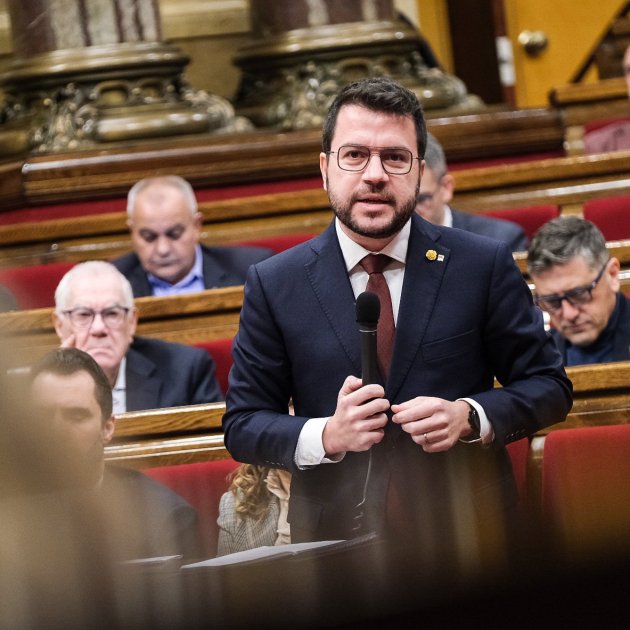The Catalan government has not waited long to respond to the affirmations over Catalonia by the Spanish prime minister, Pedro Sánchez, in his end-of-year speech this Tuesday. Sources in the Generalitat have stated that the Pere Aragonès administration will continue to "make progress which is still pending in the field of dejudicialization, as well as in the area of self-determination which must bring Catalonia to vote once again in a referendum". This after, the Spanish PM once again closed the door on the agreed referendum that his Catalan counterpart had called for on Monday: "They can demand it as much as they want but it will not happen", he affirmed during the press conference in Madrid.
Sánchez stated that the dialogue table is a "useful tool" to develop what he has labelled as "the agenda for the reencounter", and also stressed that the debate on self-determination is part of "the past". His argument is based on the claim that the right to independence is not included in any constitution. In fact, Sánchez celebrated that the Constitution is being "complied with" currently "in all the territories of Spain, also in Catalonia", and stressed that Catalan independence is no longer one of the concerns of Spaniards. For its part, the Catalan government insists that "it has been verified that dialogue works". The major achievement it claims is with regard to the reducing lawfare - the abusive pursuit of political goals through the courts. Progress, says the Aragonès government "has been made in several areas of dejudicialization: the abolition of the crime of sedition, reform of misuse of funds, Court of Accounts... The results are public and well-known".
Nevertheless, days after asserting that the fourth meeting of the dialogue table (in three years) might still happen within the time limit promised - the end of 2022 - the Catalan government has now assumed that the formal negotiation will not resume until 2023. The mentioned sources close to the Pere Aragonès government consider that the Spanish executive has been strained by everything that has happened in Madrid as a result of the reform of the Penal Code, including the institutional crisis due to the renewal of the General Council of the Judiciary. And, for this reason, argue the Catalan government sources, the Spanish coalition has not met its promise on the dialogue table.
Aragonès's speech
In a Saint Stephen's Day speech which initially focused on overcoming the pandemic and the evolution of the Catalan economy, the president of Catalonia, Pere Aragonès, concluded by announcing that, from 2023, his government will promote "a grand conversation, with the whole of society" to reach "a grand agreement" that will serve to set the foundations for "returning to vote" on Catalan independence. This, he said, would be the "new phase" of the negotiations with the Spanish government, now that the reform of the crimes of sedition and misuse of funds has been achieved.
Speaking from the premises of the National Library of Catalonia is his discourse on Monday, Aragonès made a positive assessment of the policy of dialogue with the state. The president stressed that "persistence is the key" and, in this regard, he celebrated that dialogue "is starting to bear fruit", referring to the reform of the Spanish Penal Code.
Although a part of the independence movement criticizes these achievements and the Spanish government rejects the existence of the conflict, Aragonès maintains a positive view of the changes that have taken place: "These steps forward improve the situation of all those suffering reprisals from the 1st October referendum". However, the president admitted that there is an obstacle that has not been overcome, which is "the inability of the Spanish state to respond to the large majority that wants to decide democratically, freely and peacefully the political future of the country".
A "Clarity Agreement", key for the president
Aragonès said that until it is possible to vote on the future of the country, the conflict will continue, and in order to "build through dialogue, negotiation and agreement a democratic path, which includes all of us", he once again raised his major proposal of September this year: a Catalan Clarity Agreement, partly inspired by the Canadian accord of the same name. This proposal must make visible "an agreement between us on when Catalonia should be able to exercise the right to decide again, under what conditions it should vote again so that this time all parties feel included and everyone accepts the result". This grand agreement, Aragonès pointed out, must be "explainable and homologable at an international level and scrupulously democratic because it seeks nothing other than to empower citizens".
Below, president Pere Aragonès's December 26th speech (in Catalan).
